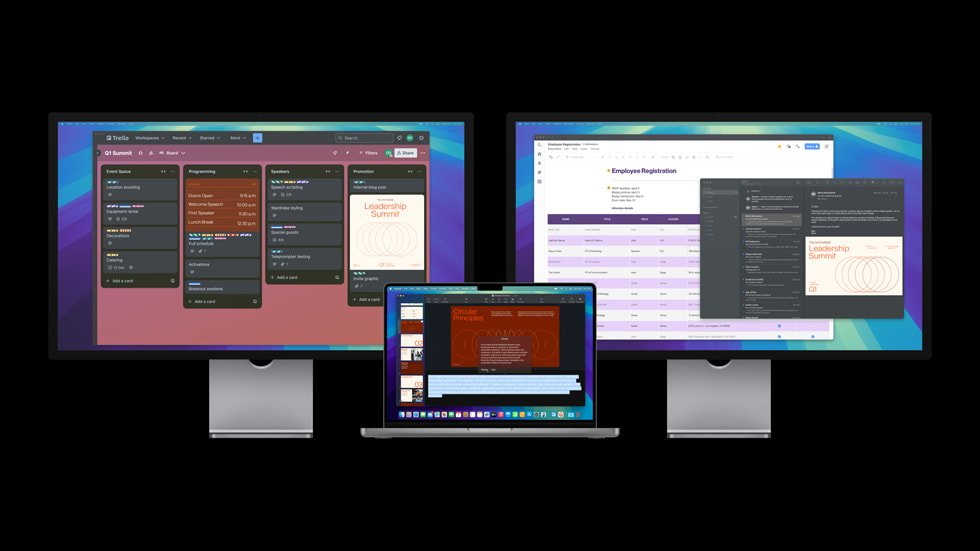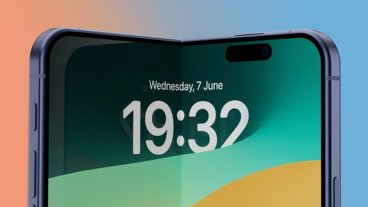Apple executives believe that by designing their own Apple Silicon chips and AI, the company now has a significant advantage over traditional chipmakers that have to cater to a wide range of markets and customers.
Apple's Vice President of Mac Product Marketing Tom Boger and Vice President of Platform Architecture Tim Millet talked about the new M4 line of chips used in recent Apple product updates in an interview with The Indian Express. The company believes doing its own chip design gives it "a tremendous strategic advantage, said Millet.
"We are not a merchant silicon company," he added in encapsulating Apple's advantage. "We do not build chips and sell them to other [companies]."
By creating chips custom-built for the devices they will go into, the company avoids compromises in overall performance. Boger added that "no other platform can touch our power performance per watt. That's the tangible benefit to users."
Industry-leading chip innovation
Boger noted the dramatic increases in performance year-over-year as successive generations of Apple Silicon are released, outpacing the progress rate of the rest of the industry. The new M4, Apple says, brings customers "the world's fastest CPU core, delivering the industry's best single-threaded performance."
The two executives say there is more to the success of Apple Silicon than just delivering speed with minimal energy usage. "We take advantage of the three major components — the architecture, the design, and the process technology," said Miller.
"Our fourth tool, really our secret weapon, I think, is our ability to co-design these amazing chips with the system teams and the product designers as they are imagining possibilities." Miller pointed to the new M4 Mac mini as an example of this.
"The opportunity was for us and for the design team to be able to come together and build this incredible new platform," he told the newspaper. "There is no way that machine could have come to life without that collaboration. And that is really what Apple is all about."
Miller noted that competing chip manufacturers "can't just go to the latest cutting edge technology like the second generation, three nanometer, but we (Apple) benefit from it in a way that we believe it is worth it. It delivers for us and our products and our customers we are trying to leave nothing on the table."
Boger added that it was rare to see the "pace of innovation year after year after year," noting that the first Apple Silicon chip debuted just four years ago. "That is the promise. That is a commitment we make to our teams to deliver innovations as they are available to us," he said.
The rise of the Neural Engine
Commenting on the rise of artificial intelligence in PC s and Apple's response of Apple Intelligence, Boger noted that there have been "intelligent" features in Macs for years. He noted that Apple first included a Neural Engine in its iPhone chip designs in 2017.
Millet added that "this was inspired by our recognition of the importance of computational photography. We were seeing the amazing research that folks up in the University of Toronto were demonstrating [that] these new neural networks were capable of doing image recognition beyond the capacity of humans, or at least matching, and they were headed on a trajectory that was clear."
"And so we pounced on the opportunity to build that embedded capability into our camera processors for the phone," Millet said. Boger added that the Neural Engine was a core part of the first M1 chip.
"We have a great architecture for AI, and we also have developers taking advantage of Apple silicon to offer our customers intelligent features," he said. "So the M Series chips were always built for AI."
Boger said that his team saw "an interesting paper" in 2017 that discussed transformer networks, now the engine behind Large Language Models (LLMs) used in AI. Boger's team saw that the technology could have a major impact on the Neural Engine, and introduced them into the first M-series chips.
"It shows you the diligence that we spend all our time trying to figure out where the ball is moving," said Miller. "We try to make sure we are there before it gets there."
Innovation driven by users
Boger said in the interview that Apple Silicon continues to push boundaries in performance and energy efficiency "because that's what our customers do." He used the M4 MacBook Pro line as an example.
"For instance, you run the most demanding workload while you have it plugged in, and then you unplug it [and] it is going to give you the exact same performance."
In noting the addition of the M4 Pro and M4 Max chips, Millet said that the memory bandwidth is a key differentiator from the regular M4. "M4 Max has effectively about twice the memory bandwidth of M4 Pro, [which] will help someone who was really pushing the edge for a very, very large model."
Millet said that Apple works closely with software partners "to look for all the best opportunities to accelerate not just generic benchmarks, which we often get judged by, but more importantly by the workloads that we are actually delivering to our customers."
"We know what the hardware system and thermal design will look like, and we understand what the process technology nodes are, and we aggressively pursue our best silicon options," Millet said. "I have been doing this for more than 30 years [and] it is the best situation to be in."
 Charles Martin
Charles Martin








-m.jpg)






 Christine McKee
Christine McKee
 Marko Zivkovic
Marko Zivkovic
 Mike Wuerthele
Mike Wuerthele

 Amber Neely
Amber Neely
 Sponsored Content
Sponsored Content
 Wesley Hilliard
Wesley Hilliard









19 Comments
It's not a "secret weapon." It was crystal clear to the entire semiconductor industry back in 2013 when Apple debuted the A7 SoC, the first 64-bit chip widely distributed in a smartphone.
It was a mic-drop moment for Apple. The rest of the industry was speechless because 64-bit wasn't expected for a couple more years. Insightful observers theorized that Apple could be on the path to a desktop processor.
So seven years later when Apple announced Apple Silicon, it wasn't that much of a surprise to the rest of the industry or people who paid attention to such things.
It has been very clear that control over the hardware, software, and service stack gives Apple an advantage that none of their competitors in various markets has. This is not "secret" or hidden. It has been in plain daylight for well over a decade.
It's amazing that even in 2024 there are journalists and technologists who still do not get this.
And remember that consumer technology innovation is driven by smartphones, the primary computing modality of consumers in the present day. It doesn't come from PCs. The A-series SoCs begat the M-series SoCs, not the other way around. And all of the major technology innovations we take for granted today -- wireless communications (including WiFi, Bluetooth, 5G+), NFC contactless payments, biometric identification, location services, digital cameras, computational photography/videography, display panel technology, battery technology, performance+efficiency cores, cloud services, etc. -- all have been driven by smartphones.
In just 4 short years, Apple went from crazy upstart coming in and sending a scare into the big cpu guys - to absolutely and unapologetically DOMINATING them. The fact that Apple now has the fastest cpu cores in the world is insane. They are steadily approaching Nvidias best GPUS as well. Before too long, it appears apple will surpass Nvidias next gen efforts. Seriously amazing stuff.
This should be unsurprising, because it’s at the heart of Apple’s business model, and is the same concept as Apple’s exclusive relationship between its hardware and operating systems. Boiled down, it’s about limiting unnecessary variables.